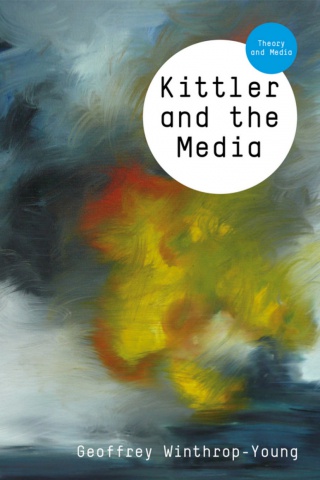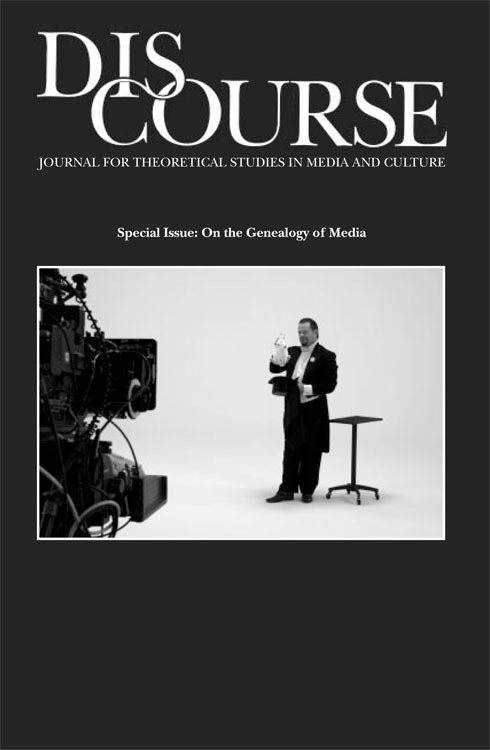Geoffrey Winthrop-Young: Kittler and the Media (2011)
Filed under book | Tags: · alphabet, biography, computing, cultural techniques, discourse, language, media, media technology, media theory, philosophy, technology

“With books such as Discourse Networks and Gramophone, Film, Typewriter and the collection Literature, Media, Information Systems, Friedrich Kittler has established himself as one of the world’s most influential media theorists. He is also one of the most controversial and misunderstood.
Kittler and the Media offers students of media theory an introduction to Kittler’s basic ideas. Following an introduction that situates Kittler’s work against the tumultuous background of German 20th-century history (from the Second World War and the cultural upheaval of the late 1960s to reunification), the book provides succinct summaries of Kittler’s early discourse-analytical work inspired by French post-structuralism, his media-related theorising and his most recent writings on cultural techniques and the notation systems of Ancient Greece.
This clear and engaging overview of a fascinating theorist will be welcomed by students and scholars alike of media, communication and cultural studies.”
Publisher Polity, 2011
Theory and Media series
ISBN 0745644066, 9780745644066
165 pages
PDF (updated on 2019-12-8)
Comments (6)Discourse 31(1/2): On The Genealogy of Media (2009)
Filed under journal | Tags: · media, media technology, media theory, mediality, philosophy, technology

“‘On the Genealogy of Media’ invokes a tradition for thinking about technology, which passes from Nietzsche through Heidegger and Freud. As a collection on media, however, these texts gathered together in this special issue include few Nietzsche readings—or even Nietzsche references—in their thread count. Indeed, Nietzsche is not typically considered a thinker of media technologies. But his genealogical interpretation of the Mass media as being on one uncanny continuum of valuation from Christianity to nihilism influenced, together with either Freud’s or Heidegger’s input, the media essays of Walter Benjamin as much as the media oeuvre of Friedrich Kittler. Following Nietzsche, then, a genealogy of media means, as in Heidegger’s questioning of technicity, that whatever technology may be it presupposes assumption of a certain (discursive) ready positioning for (and before) its advent as actual machines to which the understanding of technologization cannot be reduced. Freudian psychoanalysis views media technologies as prosthetically modeled after body parts and partings. A primary relationship to loss (as the always-new frontier of mourning where reality, the future, the other begin or begin again) is, on Freud’s turf and terms, the psychic ready position that is there before the event or advent of machinic externalities.” (from the Introduction)
With texts by Friedrich A. Kittler, Klaus Theweleit, Craig Saper, Gregory L. Ulmer, Rebecca Comay, Laurence A. Rickels, Barbara Stiegler, Tom Cohen and Avital Ronell.
Guest Editor: Laurence A. Rickels
Publisher Wayne State University Press, 2009
ISSN 1522-5321
182 pages
via Project Muse
Friedrich A. Kittler: Literature, Media, Information Systems: Essays (1997)
Filed under book | Tags: · information theory, literary theory, literature, media theory, philosophy, technology

An early collection of the writings of Friedrich Kittler in English translation.
The following essays are included: “Gramophone, Film, Typewriter”, “Dracula’s Legacy”, “Romanticism–Psychoanalysis–Film: A History of the Double”, “Media and Drugs in Pynchon’s Second World War”, “Media Wars: Trenches, Lightning, Stars”, “The World of the Symbolic–A World of the Machine”, “There Is No Software” and “Protected Mode”.
Edited and Introduced by John Johnston
Publisher OPA, Amsterdam, 1997
ISBN 9057010712
192 pages
PDF, PDF (updated on 2017-5-2)
Comments (5)
